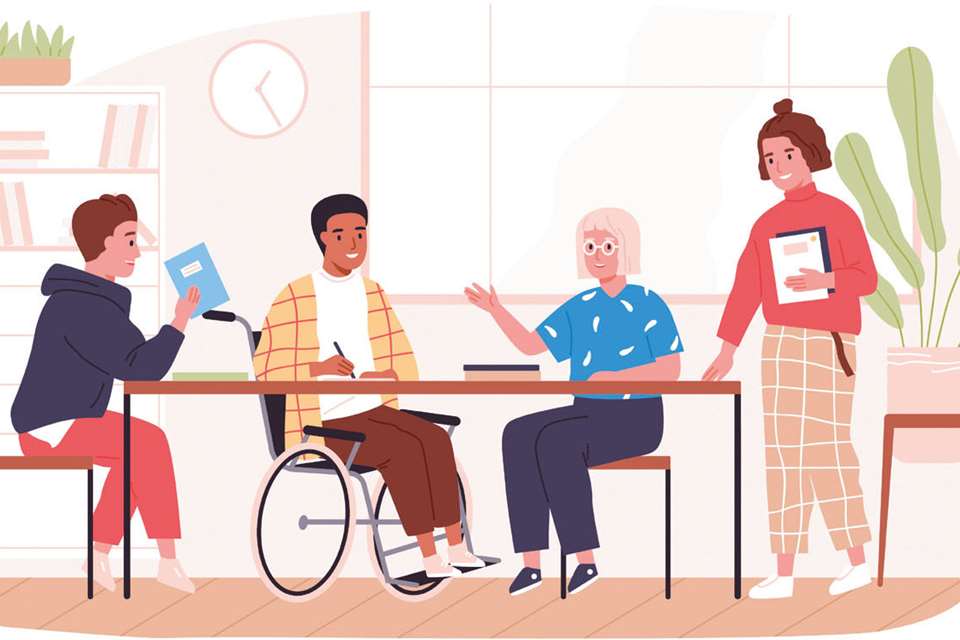A capital investment?: ACE's move to fund more projects outside of London
Hattie Fisk
Wednesday, February 1, 2023
Following Arts Council England's decision to move funding for National Portfolio Organisations away from London-based projects, Hattie Fisk investigates what this means for the provision of musical opportunities for young people across the UK.

Courtesy Brighter Sound
In November 2022, after a couple of false starts and delays, the UK arts sector braced itself for the long-awaited announcement from Arts Council England (ACE) on who was to be named a National Portfolio Organisation (NPO) between 2023 and ‘26. And rightly so. This year, ACE's decision surprised many, as you will certainly be aware if you are on Twitter, Facebook or are a regular member of a staff room.
Outlining which organisations were to join its national portfolio and receive a share of the £446 million funding pot, ACE's announcement caused a stir across the country. Many institutions who had received this funding in previous years were no longer on the list, and many who had never previously made the cut were to receive funding for the first time.
Spreading funding across the UK
In fact, there has been a 20 percent increase in the number of organisations receiving funding that deliver creative activities to children when compared to the previous round of funding. Overall, 276 of the 990 companies are receiving funding for the first time since before 2018 – an increase from 183 new companies in the last funding round.
141 organisations have dropped out of the portfolio, as ACE shifts towards funding non-London based organisations. 39.5 percent of funding was given to organisations in London in the previous round, and that has now dropped to 33.3 percent. ACE is also encouraging organisations it funds to relocate away from London as part of its Transfer Programme.
IPSO funding
The funding for the Investment Principles Support Organisation (IPSO) programme was also announced – a scheme that funds creative organisations as part of ACE's ‘Let's Create’ campaign to provide high-quality cultural experiences across the UK, including in education. Black Lives in Music and Music Mark have been announced as IPSOs as part of the ‘Let's Create’ campaign.
On the new funding announcement, Music Mark CEO, Bridget Whyte, says: ‘We are thrilled to have this commitment from ACE, and believe it signifies not only that the work of Music Mark is valued, but also that of music education as a whole. This three-year commitment, we believe, is in recognition of the advice and support we've given to colleagues over the past few years, especially during the pandemic, and our valued advisory relationship with ACE and the Department for Education.’
Positive responses
Many music-oriented institutions were pleased with the announcement, especially those that were receiving funding such as the National Children's Orchestras of Great Britain. This group's chief executive, Sophie Lewis, and artistic and educational director, Catherine Arlidge, said: ‘On behalf of everyone involved in NCO, we are delighted to receive this new funding from the Arts Council of England at this critical time for music education and children. It comes with responsibility that we will embrace, ensuring that children remain at the centre of everything we do and working to widen participation in our programme through partnership and collaboration with colleagues in the sector. We are ambitious for our organisation and young people and look forward to cementing the difference that we can make.’
Music education charity Sound Connections is to receive new funding; a spokesperson from the group says: ‘this means we can deepen our engagement with young people in London and work across England’. There has also been an increase in the amount of funding at a number of selected music education organisations, including at The National Youth Jazz Collective, Drake Music and the National Youth Orchestra.
The other side of the coin
However, there were areas of the music education sector which felt strongly that this Arts Council England decision was not the correct one.
The Musicians Union (MU) has heavily criticised the decision by ACE to make major cuts in public funding to a selection of arts organisations. The English National Opera is one of the most high-profile cases – it has had its NPO funding cut and been offered £17 million to relocate to Manchester. The MU's general secretary, Naomi Pohl, says: ‘Arts organisations have been trying to deliver their best work despite diminishing funding over the past decade. This latest news about ENO is a sad indictment of the current government's apparent disinterest in supporting the UK's arts infrastructure as a whole. Compared to government spending in other areas of the economy, and what they invested in maintaining companies during the pandemic, the money received by organisations like ENO is tiny. The government needs to give the arts overall an urgent and long overdue cash injection.’ The MU has said it is going to undertake discussions with the affected companies to work out the best plan moving forward.
Similarly, the London mayor, Sadiq Khan, has shunned the funding decisions from ACE saying: ‘Many of our world-leading cultural organisations will be left devastated by this announcement of over £50 million worth of government cuts to London's arts funding. These cuts could not have come at a worse time as arts organisations already face a triple whammy of spiralling operating costs, soaring energy bills, and the impact of both the pandemic and the cost-of-living crisis on audience figures.’
Brighter Sound
Despite the contrasting views on ACE's decision, it is crucial that we acknowledge some positive things from this round of funding. One of the new projects to receive financial aid is Brighter Sound – a music development organisation rooted in Manchester. Set to receive an instalment of £192,000 over the next three years, Brighter Sound is a music development organisation that has been working with emerging artists and young creatives for the past 22 years. The group is known for producing creative projects and residencies, and regularly engages with local young people who wish to pursue careers in the music industry. Bethan, a participant of a previous Brighter Sound residency, described their experience as ‘the sort of opportunity that decides a career or turns on a light.’ It is no wonder that Brighter Sound has been noticed by ACE – for one, it won in the Promotion of Talent and Leadership Category in the 2022 Manchester Culture Awards.
With the new funding, the first project to take place will be a residency in Bradford in March 2023, led by acclaimed saxophonist and composer Nubya Garcia. Open to emerging artists and young people, there will also be online workshops before and after the week away. The young attendees will learn about playing music live, tips about touring, releasing music and the reality of the music industry. On the week, Garcia said she is looking to ‘spend time looking at how each of us creates and aim to find ways to untangle creative blocks.’
The Manchester Experimental Orchestra
Have you ever wondered what an orchestra of young musicians aged 12–18 would sound like if it was representative of everyone in your city or town? That is exactly what Brighter Sound asked with their Manchester Experimental Orchestra project, which ran between May and July 2022. Funded by ACE (prior to gaining NPO status) and Manchester City Council, the orchestra was formed in collaboration with the Royal Northern College of Music and The Bridgewater Hall. Musicians who played any instrument or genre of music were invited to join – this included gospel singers, producers, guitarists, rappers, spoken-word artists, drummers, violists and anything else! The only requirement was that the young people were from or living in Manchester. Led by a team of young leaders, those involved rehearsed over a weekend in May and July, creating music with the prompt: what does Manchester sound like to you? Placing creativity at the feet of local young people, projects such as this one can be incredibly valuable for those involved, providing young people across the country with agency and inspiration to pursue careers in music and the arts.
SoCo Music Project
Moving down the map to Southampton, the SoCo Music Project is to receive £172,000 for the first time in the 2023–26 funding from ACE. Having delivered engaging and inspirational music making activities since 2008, SoCo has a range of programmes designed to help communities and young people with music and arts outreach schemes.
Alongside an Adult Engagement Programme, and the Elevate programme which helps those entering the music industry to record and release their own music, SoCo runs a successful programme called Engage, which aims to provide support for those who currently do not have access to rich musical experiences. This includes musical sessions for carers, an addiction recovery programme based around music, mental health sessions with music and more.
Its youth projects most recently included a set of creative activities in West Quay shopping centre, the Newtown Music foundation – a young group that are engaging in positive activities to improve skills in music and business – and a creative academy for young people outside of mainstream education to help them be creative and gain a qualification.
 © COURTESY NATIONAL YOUTH FOLK ENSEMBLE
© COURTESY NATIONAL YOUTH FOLK ENSEMBLE
National Youth Folk Ensemble 2022 – part of the English Folk Dance and Song Society that has recently received a decrease in ACE funding
Elsewhere, a promising recent project from SoCo is ‘Never Choose Knives’ – an urban music campaign written and created by five students from St. George Catholic College in collaboration with Hampshire Constabulary, the Southampton Safe City Partnership and The Saints Foundation. The young people involved were encouraged to write their own rap about making positive decisions when facing conflict on the streets, culminating in a music video that is available to watch online.
PC Maria Carrick, education and engagement coordinator at Hampshire Constabulary, says: ‘The focus, creativity and commitment demonstrated by this group of young people reinforces how fundamentally important it is to respect young people as credible partners in problem-solving issues affecting them and their community. We encourage teachers and parents to use the Never Choose Knives rap as a tool to initiate conversations with young people about the risks of carrying knives – supporting them to make safe and responsible choices to prevent themselves from becoming a victim or offender.’
English Folk Dance and Song Society
With promising initiatives such as Brighter Sounds and the SoCo Music Project presenting such worthy cases for funding, it is easy to forget those who have suffered cuts from ACE. One example that gained a mass of public support is the English Folk Dance and Song Society (EFDSS), which is the only national organisation to promote and support English folk music and dance, reaching a range of audiences that include young people and their families.
The decrease in funding, which has gone from £439,996 in the last funding round to £300,000, was done to provide them with ‘the opportunity to invest in a broader, more balanced range of organisations delivering exciting arts, culture, and creative opportunities for more people’, citing that EFDSS was based in London. In response, EFDSS established in a post on their website that while its headquarters are in London, it works right across England. It added: ‘by our reckoning, ACE funding dedicated to folk music and dance was already tiny, at £1 for every £760; next year it will be in £1 in £1116.’ On the decision, EFDSS says: ‘the significant cut to our funding is concerning for our future activities and represents the equivalent of ACE's contribution towards running the National Youth Folk Ensemble.’
A clean slate?
Despite the uproar around various branches of the announcement from ACE, as we enter 2023 it is clear that funding music-based projects for young people across the country is never a bad thing. Having focused on the capital for a number of years, this shift in ACE's commitments is something that has been in the works for a while, and something music educators in the North of England particularly have been asking for.
Situations such as this often fuel the notion that some must go without for others to gain; the sector already has divisions and fractures when it comes to funding and provision of musical opportunities for young people. I hope that in moving forward, without undermining the massive changes that some organisations will be facing financially, we can celebrate the growth of newer organisations, without blaming them for the downfall of other larger groups. Hopefully, with support from those who can donate, those who are struggling will recalibrate and recover in time.
Having said that, we have a long way to go to calm the storm that the recent funding announcement seems to have churned up, especially on social media platforms. Do find more information on the announcement, or any of the projects mentioned, below.
ACE has been contacted for further comment.
If you have a strong opinion on the topic, we would love to hear from you! Feel free to email music.teacher@markallengroup.com with a letter to the editor.
Further information is available at artscouncil.org.uk/investment23







